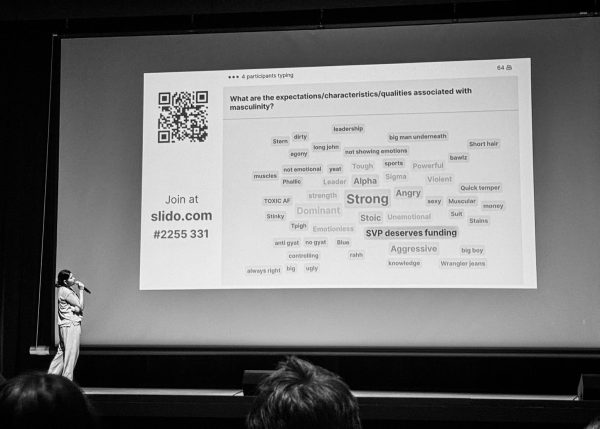On Sept. 16 in Cordiner Hall, a speaker with SHIFT consulting delivered an hour-long consent and sexual health training for this year’s incoming students. The event comes just weeks after Whitman’s student Sexual Violence Prevention group (SVP) refused to train incoming students, publicly alleging a pattern of exploitation by the college.
During their demonstration on Sept. 1, students stated their belief that the college does not prioritize SVP, citing a consistent lack of funding for their programs and little support from the administration.
The SHIFT presenter Veline Mojarro, who spoke to students, said she had been paid for the visit to campus. Mojarro declined to disclose the amount, saying she had signed a Non-Disclosure Agreement (NDA). Mojarro was also unable to recall which office had contracted her.
In an email to The Wire, Senior Associate Dean of Students Juli Dunn explained where the finances to compensate Mojarro is coming from.
“I will use funds from Opening Week, Res Life, and endowed speaker funds to cover the costs associated with Ms. Mojarro’s visit,” Dunn said.
Sophomore Resident Assistant for Lyman, Kaela Babasin, attended the event with her residents and says she is disappointed with the way Whitman handled student concerns.
“I have very strong feelings about the fact that they won’t pay our own students for certain things, but they will pay an outside organization. Especially after the amount of praise that SVP gets from the school, I think it’s appalling that they’re not paying them,” Babasin said.
Mojarro’s presentation covered topics such as rape culture, consent, bystander intervention, and unpacking the gender binary.
During an interactive section, audience members created a word cloud from the prompt “What are the expectations/characteristics/qualities associated with masculinity?”

Highlighted among the responses was the message “SVP deserves funding.”
Attendees and organizers had high hopes for this training. When attendees were still filing in, Dunn, who left shortly after the presentation started, said she hoped for a “good showing.”
“Our expectation is you understand this culture,” Dunn said. “I would hope that doesn’t have to be mandatory.”
Babasin echoed the importance of consent culture at Whitman.
“I hope that they do actually get a basic understanding of consent,” Babasin said.
Under the 2013 SaVE Act, colleges and universities that receive federal financial aid are required to provide training on topics like consent.
The presentation itself did not contain any area-specific resources. Mojarro said she typically includes resources in her presentations, and that the short notice contributed to this oversight.
“I like to have a local rape crisis line on there, any organizations that are on campus or local city organizations that are on campus,” Mojarra said. “I usually do have a resource slide. I think I was just moving too fast to be super honest, so I apologize.”
Active members of SVP Jackie Zapanta and Nate Korahais chose to attend Mojaro’s talk. Both had participated in the Sept. 1 demonstration.
Zapanta and Korahais expressed their appreciation that a third-party professional came to campus to talk about consent culture.
“There were good things, and other things that … could be specified more to Whitman’s situation,” said Zapanta.
While Korahais viewed the professional speaker as a step in the right direction, he emphasized that one of SVP’s demands has been compensation for students.
“To have peers or to have students being paid for this officially would be a wonderful thing,” Korahais said. “At the same time, general resource allocation is also a request that we have, to have a paid advisor is something that we wish would happen, to have a budget is something that we wish would happen.”
Among students, Korahais and Zapanta say, the sentiment is generally positive towards SVP.
“Students across campus were sending messages along the lines of SVP could and should be doing this, and they should be getting funded the way that [SHIFT] has,” Korahais said.
Dunn has not yet started planning the speakers for next year’s Opening Week and says this process typically begins in January.
“I am open to and welcome student feedback about Opening Week and our orientation and onboarding of new students,” Dunn said
Korahais shared that SVP has plans to be in contact with Vice President of DEI John Johnson and President Sarah Bolton. Korahais says he hopes to meet with them soon.
“I hope [for] a plan for how school resources can be used to benefit SVP and honestly I think it starts with admin having a better understanding of why we said what we said,” Korahais said.
As students left Cordiner, the final slide of SHIFT’s presentation remained illuminated on-stage: a QR code, alongside Mojaro’s closing sentence. “We value your feedback.”
Editor’s note: Kaela Babasin is an Opinion Columnist for the Wire.




